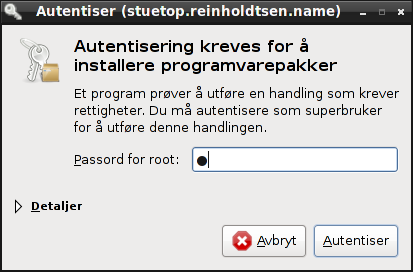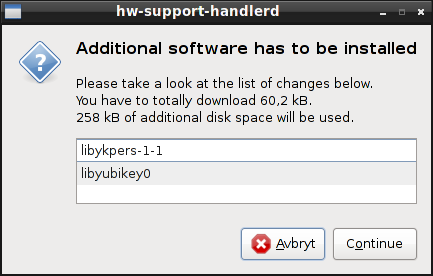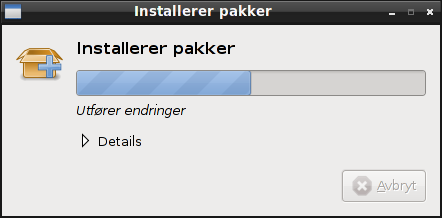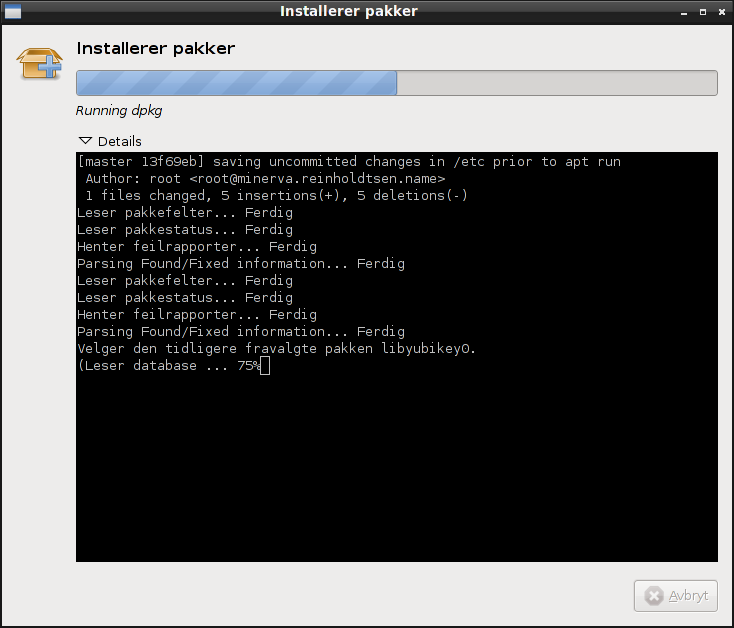Today I switched to
+my
+new laptop. I've previously written about the problems I had with
+my new Thinkpad X230, which was delivered with an
+180
+GB Intel SSD disk with Lenovo firmware that did not handle
+sustained writes. My hardware supplier have been very forthcoming in
+trying to find a solution, and after first trying with another
+identical 180 GB disks they decided to send me a 256 GB Samsung SSD
+disk instead to fix it once and for all. The Samsung disk survived
+the installation of Debian with encrypted disks (filling the disk with
+random data during installation killed the first two), and I thus
+decided to trust it with my data. I have installed it as a Debian Edu
+Wheezy roaming workstation hooked up with my Debian Edu Squeeze main
+server at home using Kerberos and LDAP, and will use it as my work
+station from now on.
+
+
As this is a solid state disk with no moving parts, I believe the
+Debian Wheezy default installation need to be tuned a bit to increase
+performance and increase life time of the disk. The Linux kernel and
+user space applications do not yet adjust automatically to such
+environment. To make it easier for my self, I created a draft Debian
+package ssd-setup to handle this tuning. The
+source
+for the ssd-setup package is available from collab-maint, and it
+is set up to adjust the setup of the machine by just installing the
+package. If there is any non-SSD disk in the machine, the package
+will refuse to install, as I did not try to write any logic to sort
+file systems in SSD and non-SSD file systems.
+
+
I consider the package a draft, as I am a bit unsure how to best
+set up Debian Wheezy with an SSD. It is adjusted to my use case,
+where I set up the machine with one large encrypted partition (in
+addition to /boot), put LVM on top of this and set up partitions on
+top of this again. See the README file in the package source for the
+references I used to pick the settings. At the moment these
+parameters are tuned:
-
- 3 Desktop
- 4 Low Profile Desktop
- 5 Pizza Box
- 6 Mini Tower
- 7 Tower
- 8 Portable
- 9 Laptop
- 10 Notebook
- 11 Hand Held
- 12 Docking Station
- 13 All In One
- 14 Sub Notebook
- 15 Space-saving
- 16 Lunch Box
- 17 Main Server Chassis
- 18 Expansion Chassis
- 19 Sub Chassis
- 20 Bus Expansion Chassis
- 21 Peripheral Chassis
- 22 RAID Chassis
- 23 Rack Mount Chassis
- 24 Sealed-case PC
- 25 Multi-system
- 26 CompactPCI
- 27 AdvancedTCA
- 28 Blade
- 29 Blade Enclosing
-
-
-
The chassis type values are not always accurately set in the DMI
-table. For example my home server is a tower, but the DMI modalias
-claim it is a desktop.
-
-
SerIO subtype
-
-
This type is used for PS/2 mouse plugs. One example is from my
-test machine:
-
-
-serio:ty01pr00id00ex00
-
-
-
The values present are
+
- ty 01 (type)
- pr 00 (prototype)
- id 00 (id)
- ex 00 (extra)
-
+
Set up cryptsetup to pass TRIM commands to the physical disk
+ (adding discard to /etc/crypttab)
-
This type is supported by the psmouse driver. I am not sure what
-the valid values are.
+
Set up LVM to pass on TRIM commands to the underlying device (in
+ this case a cryptsetup partition) by changing issue_discards from
+ 0 to 1 in /etc/lvm/lvm.conf.
-
Other subtypes
+
Set relatime as a file system option for ext3 and ext4 file
+ systems.
-
There are heaps of other modalias subtypes according to
-file2alias.c. There is the rest of the list from that source: amba,
-ap, bcma, ccw, css, eisa, hid, i2c, ieee1394, input, ipack, isapnp,
-mdio, of, parisc, pcmcia, platform, scsi, sdio, spi, ssb, vio, virtio,
-vmbus, x86cpu and zorro. I did not spend time documenting all of
-these, as they do not seem relevant for my intended use with mapping
-hardware to packages when new stuff is inserted during run time.
+
Tell swap to use TRIM commands by adding 'discard' to
+ /etc/fstab.
-
Looking up kernel modules using modalias values
+
Change I/O scheduler from cfq to deadline using a udev rule.
-
To check which kernel modules provide support for a given modalias,
-one can use the following shell script:
+
Run fstrim on every ext3 and ext4 file system every night (from
+ cron.daily).
-
- for id in $(find /sys -name modalias -print0 | xargs -0 cat | sort -u); do \
- echo "$id" ; \
- /sbin/modprobe --show-depends "$id"|sed 's/^/ /' ; \
- done
-
+
Adjust sysctl values vm.swappiness to 1 and vm.vfs_cache_pressure
+ to 50 to reduce the kernel eagerness to swap out processes.
-
The output can look like this (only the first few entries as the
-list is very long on my test machine):
+
-
- acpi:ACPI0003:
- insmod /lib/modules/2.6.32-5-686/kernel/drivers/acpi/ac.ko
- acpi:device:
- FATAL: Module acpi:device: not found.
- acpi:IBM0068:
- insmod /lib/modules/2.6.32-5-686/kernel/drivers/char/nvram.ko
- insmod /lib/modules/2.6.32-5-686/kernel/drivers/leds/led-class.ko
- insmod /lib/modules/2.6.32-5-686/kernel/net/rfkill/rfkill.ko
- insmod /lib/modules/2.6.32-5-686/kernel/drivers/platform/x86/thinkpad_acpi.ko
- acpi:IBM0071:PNP0511:
- insmod /lib/modules/2.6.32-5-686/kernel/lib/crc-ccitt.ko
- insmod /lib/modules/2.6.32-5-686/kernel/net/irda/irda.ko
- insmod /lib/modules/2.6.32-5-686/kernel/drivers/net/irda/nsc-ircc.ko
- [...]
-
-
-
If you want to help implementing a system to let us propose what
-packages to install when new hardware is plugged into a Debian
-machine, please send me an email or talk to me on
-#debian-devel.
-
-
Update 2013-01-15: Rewrite "cat $(find ...)" to
-"find ... -print0 | xargs -0 cat" to make sure it handle directories
-in /sys/ with space in them.
+
During installation, I cancelled the part where the installer fill
+the disk with random data, as this would kill the SSD performance for
+little gain. My goal with the encrypted file system is to ensure
+those stealing my laptop end up with a brick and not a working
+computer. I have no hope in keeping the really resourceful people
+from getting the data on the disk (see
+XKCD #538 for an explanation why).
+Thus I concluded that adding the discard option to crypttab is the
+right thing to do.
+
+
I considered using the noop I/O scheduler, as several recommended
+it for SSD, but others recommended deadline and a benchmark I found
+indicated that deadline might be better for interactive use.
+
+
I also considered using the 'discard' file system option for ext3
+and ext4, but read that it would give a performance hit ever time a
+file is removed, and thought it best to that that slowdown once a day
+instead of during my work.
+
+
My package do not set up tmpfs on /var/run, /var/lock and /tmp, as
+this is already done by Debian Edu.
+
+
I have not yet started on the user space tuning. I expect
+iceweasel need some tuning, and perhaps other applications too, but
+have not yet had time to investigate those parts.
+
+
The package should work on Ubuntu too, but I have not yet tested it
+there.
+
+
As for the answer to the question in the title of this blog post,
+as far as I know, the only solution I know about is to replace the
+disk. It might be possible to flash it with Intel firmware instead of
+the Lenovo firmware. But I have not tried and did not want to do so
+without approval from Lenovo as I wanted to keep the warranty on the
+disk until a solution was found and they wanted the broken disks
+back.
+
 -
- -
- -
- -
-
